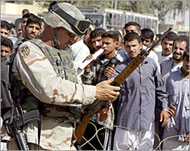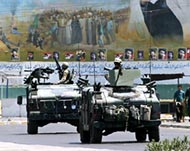Iraq: Full sovereignty after 30 June?
The definition of the term “sovereignty” has always been controversial in political science.

But as the 30 June handover of power to an interim Iraqi government draws closer, the definition itself may become a source of contention and disagreement.
In a nutshell, domestic sovereignty refers to the power and authority of the state, exercised through its legal representatives, over all persons, things and territory within its reach.
Externally, sovereignty means independence that is the right of the state, within the limits permitted by international law, to conduct its own affairs without direction, interference or control by any state or international organisation.
The Oxford Dictionary defines sovereignty as supremacy, self-government, and/or self-governing State.
These definitions, by and of themselves, imply a number of rights, such as supreme power, ability to pass laws, and independence.
However, many believe that the term has ceased to convey its traditional meaning, and increasingly has taken on a much weaker definition that suits the current international environment.
No legal basis
Tony Benn, a former Labour member of the UK parliament and anti-Iraq war activist, told Aljazeera.net that what the US is trying to do in Iraq is “complete fraud”.
 |
|
Occupation forces will remain in |
“Sovereignty is to enjoy absolute power in your country. A government was appointed, the Americans intend to stay and they have built 10 or 12 bases, laws which allow the privatisation of Iraqi assets and the export of profits, so I think it is a complete fraud,” Benn said.
Benn argues that the process lacks any legal basis, describing Iraqi sovereignty as having been stolen by the US.
“Who gave the Americans the Iraqi sovereignty which they are now giving back? What is the coalition’s miracle legal claim to sovereignty, other than invasion and occupation?”
Incomplete sovereignty
Former Iraqi ambassador to the UN, Dr Mohamad al-Douri, believes that sovereignty is an absolute, which cannot be divided or partially handed over.
“It is an incomplete sovereignty. Incomplete sovereignty means no sovereignty. Sovereignty in international law means to have full control over the ‘region’, such as the country’s land, air-space, and sea,” al-Douri told Aljazeera.net.
“As a result, a sovereign country would be recognised in the UN, while a country of incomplete sovereignty would not.”
He said a sovereign government cannot be appointed by occupation authorities and that international law does not recognise such an appointment. He believes that the interim Iraqi government will be dedicated to the day-to-day affairs, lacking as it does the legal requirements of a government.
 |
|
Occupation forces will be invited |
“A sovereign government appointed by an occupier … that just cannot be right.”
When asked whether the incumbent Iraqi government will win back Iraq’s seat in the UN, al-Douri says that while it is illegal it is not impossible, stressing that interests rule politics and consequently, many countries would sacrifice law, principles, and morals.
“The UN has always been hijacked. I think the UN is subordinate to the US. As a result, the US may put pressure on UN member states to vote in favour of any project submitted by the US,” he said.
Afghan parallel
Abd al-Bari Atwan, editor-in-chief of the London based Arabic newspaper al-Quds al-Arabi, says the new Iraqi government will be an Afghanistan-style set-up.
The same Afghanistan scenario is being repeated in Iraq, Atwan explains, pointing out that the UN envoy who monitored the transition in Afghanistan, Lakhdar Brahimi, was until recently charged overseeing Iraq‘s 30 June handover.
“It is three years now since the Taliban was removed from power, and what has happened in Afghanistan? A weak government which does not enjoy any control outside the capital, a miserable country, armed militias moving freely across the land, and starving people. I fear that the same scenario will be repeated in Iraq.”
|
“We are guaranteeing them [Iraqis] complete sovereignty from President Bush |
He considers the 30 June process as a handover of ministerial and administrational powers and that US authorities will not go beyond relinquishing “the headache of administrating the country to the Iraqis”.
“We cannot say it will be a government, or it is a process of handing over sovereignty. When we talk about a sovereign country, we mean its government is totally free in passing laws and issuing decisions,” Atwan said.
“A sovereign government can tell foreign troops to leave its national soil and is capable of protecting itself and the people, through the country’s constitutional and military infrastructure,” he added.
Conditional sovereignty
On 2 June, the day the transitional Iraqi government was formerly announced, a senior Iranian national security official openly welcomed the new transitional Iraqi government.
“This government may not fulfil all of our expectations, but it is a step forward. We are happy that this government has begun its work,” said Hassan Rowhani, a Shia cleric who heads Iran’s Islamic Republic’s Supreme National Security Council.
“We hope that this government organises free elections that lead to the formation of a national government and national sovereignty,” he added.
Speaking to Aljazeera.net, Michel Aoun, the former Lebanese militia commander now living in exile in Paris, said the Iraqi government would be a sovereign one if US forces withdrew from Iraq.
“I think the government of June 30 will enjoy sovereignty because it is a national government. It will win its full legitimacy if the US forces withdraw – even gradually – from Iraq and an election is held,” he said.
Complete sovereignty
A few days before he was expected to visit France for World War II commemorations, US President George Bush told French magazine Paris Match that he does not consider all Iraqis fighting the US occupation to be “terrorists”, and that is why the US is giving sovereignty back to Iraqis.
“The suicide bombers are, but the other fighters aren’t. They just don’t want to be occupied. Not even me, nobody, would want to be. That’s why we’re giving them their sovereignty.
“We are guaranteeing them complete sovereignty from June 30,” Paris Match quoted him as saying.
US Secretary of State Colin Powell said the United States is seeking with the interim government a similar arrangement that it has had with allies such as Germany and South Korea.
“It has full sovereignty,” Powell said of the interim government, “and it is inviting the coalition military forces to remain there with the consent of this sovereign government because they are not yet ready and able to provide for their own security”.